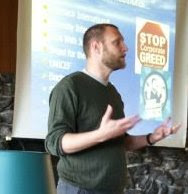Our World and the Fig Tree
Some people around Jesus ask him about the recent (?) execution of a group of Galilean pilgrims at the hand of Pilate (in Jerusalem?). This comes after Jesus encourages people to "settle with their opponent" before it is too late - so it is possible that the crowd is asking Jesus if Pilate's treatment of the pilgrims is a result of divine judgement, or perhaps an occasion to sound out Jesus' feelings on the Roman occupation. The Galileans, apparently, are being thought of as either holy martyrs or sinners who were duly punished (by proxy via the Roman occupation).
Jesus, however, cuts through the fat of the argument and gets to the point: do you think, he asks the crowd, that these Galileans were any worse (or better) than any other group of Galileans, that they deserved the fate they met in Jerusalem? No.
And, Jesus adds, if you continue acting and thinking they way you do, you will meet the same end they did.
What?! What is Jesus saying here? The trouble is, we don't know from the text anything about these Galileans and their beliefs. Is Jesus making a political point that if we continue to support or resist the occupation, we will be subject to it, and therefore forever under threat of execution by it? Or is Jesus making some religious point that beliefs similar to the Galileans ends in sticky deaths? (And is it also important that Jesus was himself referred to as a Galilean - does the region imply some background religious or political flavor?)
Jesus seems to emphasize his point by adding the comparison with innocents who were killed when a tower collapsed. Why just them? Were they worse than everyone else in Jerusalem?
Is Jesus here taking a stand somewhat like Job, pointing out that chance seems also to play a part in the world, that the world is not always just and fair. Sometimes innocent perish along with the guilty, suffering and fortune do not signal righteousness or sin. Who can know the mind and will of God, in a world such as this? The book of Job ends with the demand that we believe and have confidence in God regardless, despite all the chaos and seeming senselessness of the world around us (which, for all it's drawbacks, is at least more honest about the world than the Calvinist piety-prosperity principle).
But then Jesus says, No - they were no worse (or better?) than any of you - but unless you repent (metanoia: [Gk] change your way of thinking, change direction, turn around) you will perish as they did - randomly, senselessly, innocent along with the guilty, unforseeably? With this would-be clarification of what he means, Jesus ends up making the confusion even greater.
Unless....
Jesus follows this discussion with a parable of a barren fig tree, which for three years hasn't borne fruit - the landlord said "cut it down." The gardener, though, asked for one more year, a year in which he would dig around the tree and fertilize the soil, to see if this didn't cause the tree to fruit.
I think Luke is putting this parable here in order to make two points: first, there is always hope - even after three years, the gardener still pleads with the landlord for time to nurture the tree to see it bear fruit. At the same time, however, there is a point after which continuing to waste time on a tree that will not bear fruit is poor stewardship of resources. There is a sense of enduring hope, but not endless permission for inactivity.
Secondly, Luke is contrasting the former discussion with the latter - religious pilgrims and random people on the street all meet their deaths in seemingly senseless violence and caprice. But the fig tree is judged on whether or not it bears fruit - its existence is laid against a backdrop of an expectation of productivity. Is Luke saying that those who put their hope in the other-worldly, in the power of God outside of them, are doomed to die just like those who have no such confidence and spend their time hoping for redemption in the streets beneath towers of human accomplishment? (The Galileans were religious pilgrims killed by the state; the eighteen people in the streets were killed by a chance collapsing of a tower.)
Is Luke advocating a Third Way? A blend of hope in the divine and a commitment to working to change this world in that vision? The admixture seems typically Lucan: discipleship is grounded in a transformation of ourselves that comes from outside ourselves, but that transformation necessarily leads to our intentional living as to transform the lived-world around us.
Is this what the fig tree is supposed to teach us? That we are forgiven for our reluctance or misunderstanding up to this point, but there is a limit to even God's patience, and we must at some point decide (or, more accurately, to continue to not decide or commit is itself a decision and commitment not to bear fruit).
Labels: Luke, Way of the Cross (Discipleship)



0 Comments:
Post a Comment
<< Home